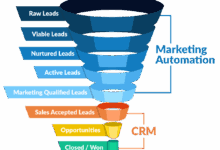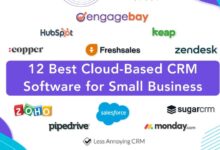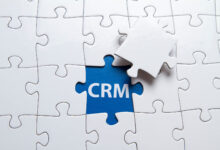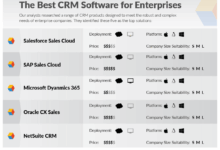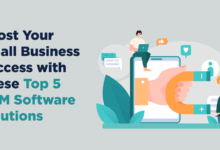Affordable CRM Software for Startups
Affordable CRM Software for Startups: Navigating the world of customer relationship management (CRM) can feel overwhelming for a new business. Finding the right balance between functionality and budget is crucial for startups, which often operate on tight resources. This guide explores how startups can leverage affordable CRM solutions to streamline operations, enhance customer relationships, and ultimately, drive growth without breaking the bank. We’ll examine key features, integration capabilities, ease of use, scalability, and security considerations to help you make an informed decision.
Choosing the right CRM is a pivotal step for any startup. This guide provides a practical framework for evaluating different affordable options, considering factors like pricing models, essential features, and long-term scalability. We’ll delve into the nuances of various pricing structures, highlight crucial features for early-stage businesses, and explore the importance of seamless integration with other essential business tools. Ultimately, our goal is to empower startups to select a CRM that not only fits their current needs but also supports their future growth trajectory.
Defining “Affordable” for Startups
Defining “affordable” CRM software for startups is relative and depends heavily on the specific needs and financial capacity of the business. A solution deemed affordable for a bootstrapped startup with a small team might be considered expensive for a well-funded company with rapid growth. Several key factors influence what constitutes an acceptable price point.
Factors Influencing CRM Budget for Startups
The budget a startup allocates to CRM software is influenced by various factors. These include the startup’s overall funding, the size of its sales team, the complexity of its sales process, the number of features required, and the expected return on investment (ROI). A seed-funded startup with limited resources will prioritize cost-effectiveness over extensive features, while a venture-backed company may be willing to invest more for a more comprehensive solution. The anticipated revenue generation from improved sales efficiency directly impacts the justifiable expense.
CRM Pricing Models
Several pricing models exist for CRM software, each with its own implications for startup budgets. Freemium models offer basic functionality for free, with paid upgrades for advanced features. Subscription models charge a recurring fee based on usage or the number of users. Per-user pricing models charge a fee for each individual accessing the CRM system. The optimal model depends on the startup’s current and projected needs. A freemium model might suffice initially, but as the company grows, a subscription or per-user model might become necessary to access the needed features and support a larger team.
Long-Term Cost Implications of CRM Selection
Choosing a CRM solution involves considering not only the initial cost but also long-term expenses. Hidden costs such as implementation fees, customization charges, training expenses, and ongoing maintenance can significantly impact the total cost of ownership. Furthermore, switching CRM systems later can be time-consuming and expensive. Therefore, startups should carefully evaluate their needs and choose a scalable solution that can adapt to their growth without requiring frequent upgrades or migrations. A seemingly inexpensive solution that lacks scalability could become a costly mistake in the long run. For example, a startup initially using a free plan might find itself facing substantial data migration costs when it outgrows the free tier’s limitations.
Comparison of Affordable CRM Pricing Tiers
The following table compares the pricing tiers of some popular affordable CRM options. Note that pricing can change, so it’s crucial to check the vendor’s website for the most up-to-date information. This table provides a general overview and should not be considered exhaustive.
| CRM Software | Free Plan | Basic Paid Plan (approx. monthly cost) | Advanced Paid Plan (approx. monthly cost) |
|---|---|---|---|
| HubSpot CRM | Yes, with limitations | $0 (with limitations, often requiring add-ons) | Varies greatly based on features and users |
| Zoho CRM | Yes, with limitations | ~$14 per user/month | ~$35 per user/month |
| Freshsales CRM | Yes, with limitations | ~$12 per user/month | ~$49 per user/month |
| Bitrix24 | Yes, with limitations | ~$39 per month (for a team) | ~$199 per month (for a team) |
Key Features for Startups
Choosing the right CRM is crucial for a startup’s growth. Early-stage businesses need tools that are both affordable and effective, focusing on core functionalities that drive sales and customer relationships without unnecessary complexity or cost. This section details essential CRM features for startups, highlighting the trade-offs between basic and advanced options and illustrating their benefits.
Early-stage startups often operate with limited budgets. Therefore, selecting a CRM involves careful consideration of features. While advanced features like predictive analytics or complex automation might be desirable, they may not be necessary or cost-effective in the initial stages. Focusing on core functionalities that directly impact sales and customer relationships provides a better return on investment. This strategy allows startups to scale their CRM usage as they grow and their needs evolve.
Essential CRM Features for Startups
Contact management, sales pipeline visualization, and basic reporting are the foundational elements of any effective CRM for a startup. Robust contact management allows for centralized storage and organization of all customer interactions. A clear visual representation of the sales pipeline enables effective tracking of leads and deals. Basic reporting provides key performance indicators (KPIs) to monitor sales progress and identify areas for improvement. For example, a startup using a CRM with robust contact management can easily segment its customer base for targeted marketing campaigns, leading to higher conversion rates. Similarly, visualizing the sales pipeline helps identify bottlenecks and close deals faster. Basic reporting on sales performance allows for data-driven decision-making, optimizing sales strategies and resource allocation.
Trade-offs Between Essential and Advanced Features
Budget-friendly CRMs often prioritize essential features over advanced functionalities. While advanced features like marketing automation, customer support ticketing systems, or advanced analytics can be beneficial, they often come at a higher price point. Startups need to carefully evaluate their immediate needs and prioritize features that directly contribute to revenue generation and customer satisfaction. For example, a startup might initially forgo advanced marketing automation tools in favor of a simpler email marketing integration, focusing on building a strong foundation before investing in more sophisticated capabilities.
Examples of Feature Benefits for Startups
- Contact Management: Imagine a startup selling handcrafted jewelry. A CRM allows them to store customer details, purchase history, communication preferences, and even notes from conversations. This enables personalized marketing campaigns and exceptional customer service, fostering loyalty and repeat business.
- Sales Pipeline: A SaaS startup can use a visual sales pipeline to track leads through different stages – from initial contact to closed deal. This provides a clear overview of the sales process, allowing the team to identify potential bottlenecks and focus on nurturing high-potential leads.
- Reporting: A food delivery startup can use basic reporting to analyze order volume, customer demographics, and popular dishes. This data informs menu adjustments, marketing strategies, and operational decisions, optimizing efficiency and profitability.
Must-Have and Desirable CRM Features for Startups
Choosing the right features is key to maximizing ROI. Here’s a breakdown:
Must-Have Features:
- Contact Management (including custom fields)
- Deal/Opportunity Management (sales pipeline visualization)
- Basic Reporting and Analytics (sales performance, lead conversion rates)
- Email Integration
- Mobile Accessibility
Desirable Features (Consider as budget allows):
- Task Management
- Calendar Integration
- Customer Segmentation
- Basic Marketing Automation (e.g., email sequences)
Integration Capabilities
A robust CRM system for a startup isn’t just about contact management; it’s about seamless data flow across your entire business ecosystem. Integrating your CRM with other essential tools significantly enhances efficiency, improves data accuracy, and ultimately fuels growth. This section explores the importance of these integrations, compares integration capabilities across different affordable CRMs, and weighs the benefits and drawbacks of integrated versus standalone solutions.
The importance of integrating your CRM with other business tools cannot be overstated. A fragmented system, where data resides in silos, leads to inefficiencies, missed opportunities, and duplicated effort. Imagine manually transferring customer data from your email marketing platform to your CRM – time-consuming and prone to errors. Seamless integration eliminates this, allowing for real-time data synchronization and a unified view of your customer interactions.
CRM Integration with Other Business Tools
Effective integration streamlines workflows by connecting your CRM with tools like email marketing platforms (Mailchimp, Constant Contact), social media management tools (Hootsuite, Buffer), e-commerce platforms (Shopify, WooCommerce), and accounting software (Xero, QuickBooks). This synchronization allows for automated tasks, such as updating customer information across platforms or triggering automated email sequences based on CRM activity. For example, a new lead added to your CRM could automatically be added to a specific email marketing list, nurturing them through a pre-defined sequence of emails.
Comparing Integration Capabilities of Affordable CRM Systems
Different affordable CRM systems offer varying levels of integration capabilities. Some may boast native integrations with popular tools, while others rely on third-party apps or APIs (Application Programming Interfaces) to connect. Native integrations generally offer a smoother, more reliable connection, while third-party integrations might require more technical expertise to set up and maintain. The breadth and depth of available integrations are crucial factors to consider when choosing a CRM. For instance, HubSpot’s free CRM offers a wide range of native integrations, while Zoho CRM excels in its customizability and API access, allowing for more extensive integrations, though potentially requiring more technical setup.
Integrated versus Standalone Solutions: Benefits and Drawbacks
Choosing between an integrated or standalone CRM solution involves weighing several factors. Integrated solutions often offer a more streamlined experience, reducing data silos and improving efficiency. However, they might be less flexible and could lock you into a specific ecosystem of tools. Standalone CRMs, on the other hand, offer greater flexibility in choosing your other business tools, but require careful management to ensure data consistency and avoid duplication. The ideal choice depends on your specific needs and technical capabilities. A startup with limited resources and technical expertise might find an integrated solution easier to manage, while a more technically proficient startup with specific integration requirements might opt for a standalone solution.
Integration Options for Popular Affordable CRMs
| CRM | Email Marketing | Social Media | E-commerce |
|---|---|---|---|
| HubSpot CRM | Mailchimp, Constant Contact, ActiveCampaign | Hootsuite, Buffer, Sprout Social | Shopify, WooCommerce |
| Zoho CRM | Mailchimp, Constant Contact, Zoho Campaigns | Various via APIs and third-party apps | Various via APIs and third-party apps |
| Freshsales | Mailchimp, Constant Contact | Limited native integrations, API access available | Limited native integrations, API access available |
| Bitrix24 | Native integration | Native integration | Limited native integrations, API access available |
Ease of Use and Implementation
For startups, choosing a CRM isn’t just about features; it’s about seamless integration into daily workflows. An intuitive system minimizes training time and maximizes team productivity, directly impacting a startup’s bottom line. The ideal user experience should prioritize simplicity and efficiency, allowing teams to focus on growth, not software navigation.
The learning curve significantly impacts a startup’s ability to quickly adopt and benefit from a CRM. A steep learning curve can lead to frustration, low adoption rates, and ultimately, wasted investment. Conversely, an easy-to-use platform allows for rapid implementation and immediate productivity gains.
Learning Curves of Affordable CRM Platforms
Different affordable CRM platforms offer varying levels of user-friendliness. Some, like HubSpot’s free CRM, are designed with a very intuitive interface and require minimal training. Users can often begin inputting data and managing contacts effectively within a few hours. Others, while offering more robust features, might necessitate more extensive training and a longer onboarding process. For example, while Zoho CRM is powerful, its extensive feature set might present a steeper learning curve for users unfamiliar with CRM software. The key is to carefully weigh the feature set against the ease of implementation when selecting a platform for a startup.
User-Friendliness and Team Adoption
A user-friendly interface directly correlates with team adoption and productivity. When a CRM is easy to navigate and understand, employees are more likely to use it consistently. This leads to better data accuracy, improved customer relationship management, and enhanced sales performance. Conversely, a complex and confusing system will likely result in low adoption rates, inconsistent data, and a diminished return on investment. For example, a startup utilizing a cumbersome CRM might experience delays in lead qualification, missed follow-ups, and an overall decline in sales efficiency. The ease of use directly translates into tangible business outcomes.
User Interface Elements Contributing to Ease of Use
Several user interface (UI) elements contribute significantly to a CRM’s ease of use. Clear and concise navigation menus, intuitive dashboards providing at-a-glance insights into key metrics (like sales pipeline progress or customer engagement), and easily customizable views are crucial. Drag-and-drop functionality for organizing data, pre-built templates for common tasks (such as email sequences or reports), and readily available help documentation or tutorials all significantly improve the user experience. For instance, a CRM with a clean, uncluttered interface featuring large, easily identifiable buttons and icons, combined with context-sensitive help, will be far more accessible than one with a dense, confusing layout. A well-designed search function is also essential for quickly locating specific information within the system.
Scalability and Future Growth
Choosing a CRM that can grow with your startup is crucial for long-term success. A system that struggles to keep pace with your expanding business will quickly become a bottleneck, hindering efficiency and potentially costing you valuable time and resources. This section explores the importance of scalability in CRM selection and how to navigate the associated costs and options.
Scalability in a CRM refers to its ability to adapt to increasing data volumes, user numbers, and feature requirements without significant performance degradation or prohibitive cost increases. For startups, this is paramount as rapid growth is often the goal. A scalable CRM allows you to add users, integrate new tools, and manage larger datasets without needing to completely overhaul your system. This flexibility prevents disruption during critical growth phases and ensures your CRM remains a valuable asset.
Scalability Options in Affordable CRM Solutions
Different affordable CRM solutions offer varying degrees of scalability. Cloud-based CRMs generally offer better scalability than on-premise solutions. Cloud providers handle the infrastructure, allowing you to easily scale up or down resources (like storage and processing power) as needed, usually by adjusting your subscription plan. On-premise systems require significant upfront investment in hardware and IT expertise, making scaling a more complex and potentially costly undertaking. Some affordable CRMs may offer tiered pricing plans that allow you to upgrade to higher-capacity plans as your needs grow. Others might offer add-on modules or integrations to extend functionality without requiring a complete platform change. For example, a small startup might begin with a basic plan handling a few hundred contacts, then upgrade to a plan managing thousands as they grow.
Costs Associated with CRM Scaling
Scaling a CRM system can involve various costs. These include:
- Increased subscription fees: Moving to a higher-tiered plan with increased storage, user licenses, or features typically involves higher monthly or annual costs.
- Integration costs: Adding new integrations with other business tools might involve one-time setup fees or ongoing subscription costs for those integrations.
- Customization costs: If your CRM needs significant customization to fit your evolving business processes, this can involve professional services fees from developers or consultants.
- Data migration costs: If you decide to switch to a different CRM platform as you scale, migrating your existing data can be time-consuming and expensive, requiring specialized services or software.
- Training costs: As your team grows, training new users on the CRM system might be necessary, potentially requiring internal resources or external training providers.
CRM Scaling Flowchart for Startups
The following flowchart illustrates a potential scaling path for a startup’s CRM usage:
[Diagram description: The flowchart begins with a “Startup Phase” box, indicating a small team and basic contact management. An arrow leads to a “Growth Phase” box, showing increased team size and more complex sales processes. From here, two paths branch out. One leads to a “Scale Up CRM Plan” box, representing an upgrade to a higher-tiered plan within the existing CRM. The other leads to a “CRM Migration” box, depicting a transition to a different, more robust CRM system. Both paths eventually lead to a final “Mature Business” box, illustrating a large team with sophisticated CRM usage and integrated systems.]
Security and Data Protection
Protecting your startup’s valuable customer data is paramount. A robust security infrastructure within your chosen CRM is not merely a desirable feature; it’s a fundamental necessity. Failing to prioritize data security can lead to significant financial losses, reputational damage, and legal repercussions. This section explores key security considerations when selecting and using a CRM.
Choosing a CRM with inadequate security measures can expose your business to a range of risks, from simple data breaches to more serious legal ramifications. Understanding these risks and implementing appropriate safeguards is critical for sustainable growth.
Key Security Features to Consider
When evaluating affordable CRM options, several key security features should be prioritized. These include data encryption both in transit (using HTTPS) and at rest, multi-factor authentication (MFA) to restrict access, access control mechanisms allowing granular permission settings for different user roles, regular security audits and updates to address vulnerabilities, and robust backup and disaster recovery plans to ensure data availability in case of unforeseen events. The presence of these features demonstrates a vendor’s commitment to data protection.
Comparison of Security Protocols Across Affordable CRM Options
While a detailed comparison across all affordable CRMs is beyond the scope of this document, a general observation can be made. Many cloud-based CRMs, even affordable ones, leverage industry-standard security protocols such as TLS/SSL for data encryption and employ data centers with physical security measures. However, the specific features and their implementation can vary. For example, some may offer more granular access controls than others, or have more frequent security updates. It’s crucial to carefully review each vendor’s security documentation and independently verify their claims. Consider looking for certifications like ISO 27001, which demonstrates a commitment to information security management.
Potential Risks Associated with Inadequate Data Security
Inadequate data security in a CRM can result in several significant risks. Data breaches can lead to the exposure of sensitive customer information, such as names, addresses, email addresses, and financial details. This can result in identity theft, financial losses for customers, and reputational damage for the startup. Furthermore, non-compliance with data protection regulations like GDPR or CCPA can lead to substantial fines and legal action. The loss of customer trust is another critical consequence, potentially hindering future growth and harming the startup’s long-term prospects. A real-world example is the case of a small e-commerce business that suffered a data breach due to weak password policies, resulting in significant customer churn and legal fees.
Security Best Practices for Startup CRM Usage
Implementing robust security practices is essential, regardless of the CRM’s inherent security features. These practices should be part of a comprehensive security policy.
- Strong Passwords and MFA: Enforce strong, unique passwords for all users and mandate the use of multi-factor authentication (MFA) wherever possible.
- Regular Security Audits: Conduct regular security audits and penetration testing to identify and address vulnerabilities.
- Access Control Management: Implement role-based access control (RBAC) to limit user access to only necessary data and functions.
- Data Encryption: Ensure all data, both in transit and at rest, is encrypted using industry-standard encryption protocols.
- Employee Training: Educate employees on security best practices, including phishing awareness and password management.
- Regular Software Updates: Keep the CRM software and all related integrations up-to-date with the latest security patches.
- Data Backup and Recovery: Establish a robust data backup and disaster recovery plan to ensure business continuity in case of a data loss event.
- Compliance with Regulations: Ensure compliance with all relevant data protection regulations, such as GDPR and CCPA.
Customer Support and Resources
For startups, choosing the right CRM is crucial for growth, but equally important is the ongoing support provided by the vendor. Reliable customer support can significantly impact a startup’s ability to effectively utilize the CRM, maximizing its return on investment and minimizing disruptions to workflow. The right support can transform a potentially frustrating experience into a powerful tool for business growth.
Customer support significantly impacts a startup’s success with CRM software. Lack of adequate support can lead to lost productivity, frustrated employees, and ultimately, hindered business growth. Conversely, readily available and responsive support enables quick resolution of issues, faster user adoption, and a more positive overall experience.
Customer Support Options Among Affordable CRM Providers
Affordable CRM providers typically offer a range of customer support options, varying in cost and responsiveness. Some offer email support as a standard feature, while others provide phone support, often at an additional cost. Live chat support is becoming increasingly common, providing immediate assistance for urgent issues. Many providers also offer access to a knowledge base, FAQs, and online tutorials. The level of support offered can vary significantly depending on the pricing tier; higher-tier plans often include prioritized support and dedicated account managers. For example, a provider like HubSpot offers various support levels tied to their pricing plans, ranging from email-only support for their free plan to 24/7 phone and chat support for their higher-tier enterprise solutions. Another example is Zoho CRM, which offers multiple support channels including phone, email, and chat support, with varying response times depending on the plan.
Value of readily Available Resources
Comprehensive documentation, tutorials, and active community forums are invaluable resources for startups using CRM software. These resources empower users to solve problems independently, reducing reliance on direct support and freeing up support teams to handle more complex issues. Well-structured documentation provides clear explanations of features and functionalities, while tutorials offer step-by-step guidance on common tasks. Active community forums facilitate peer-to-peer learning and troubleshooting, fostering a sense of community and enabling users to learn from each other’s experiences. For instance, a company might provide video tutorials demonstrating how to customize dashboards or integrate with other business applications. A robust knowledge base with detailed FAQs can resolve many common questions before a user even needs to contact support.
Effective Customer Support Mechanisms
Effective customer support for CRM software goes beyond simply answering questions. It involves proactive engagement, personalized assistance, and a commitment to continuous improvement. This might include personalized onboarding sessions for new users, regular check-ins to assess satisfaction and identify areas for improvement, and proactive notifications about system updates or new features. Examples of effective mechanisms include: a dedicated support email address with guaranteed response times, a comprehensive knowledge base with searchable articles and FAQs, a user-friendly online community forum, and a ticketing system that tracks and manages support requests. Furthermore, proactive outreach such as email newsletters with tips and tricks, or webinars on best practices, can significantly improve user experience and demonstrate a commitment to customer success.
Illustrative Examples of Affordable CRMs
Choosing the right CRM can be overwhelming for startups with limited budgets. This section provides detailed overviews of three affordable CRM options, highlighting their strengths, weaknesses, and suitability for different startup needs. We’ll consider pricing, core features, and target audiences to help you make an informed decision.
HubSpot CRM
HubSpot CRM offers a robust free plan, making it a popular choice for bootstrapped startups. Its strengths lie in its ease of use and extensive features even at the free tier. The intuitive interface requires minimal training, allowing teams to quickly adopt the system. The free plan includes contact management, deal tracking, and basic reporting, sufficient for many early-stage businesses. However, the free plan lacks advanced features like marketing automation and sales forecasting found in paid plans. As the startup grows, the limitations of the free plan might become apparent, requiring a transition to a paid subscription. This transition can be relatively seamless, as the paid plans build upon the functionalities of the free plan. HubSpot’s target audience is broad, encompassing startups across various industries. Pricing varies significantly depending on the chosen plan and add-ons, ranging from the free plan to enterprise-level subscriptions.
Zoho CRM
Zoho CRM provides a comprehensive suite of tools at a competitive price point, catering to startups with diverse needs. It offers a wider array of features compared to HubSpot’s free plan, including workflow automation, sales forecasting, and custom reporting. The interface is relatively user-friendly, though it may have a slightly steeper learning curve than HubSpot. Zoho CRM’s strength lies in its scalability; it can adapt to the evolving needs of a growing startup, offering various pricing tiers to accommodate different budgets and feature requirements. A potential weakness is the sheer number of features, which can feel overwhelming for users initially. The extensive feature set might not be fully utilized by smaller startups, leading to unnecessary expense. Zoho CRM targets small and medium-sized businesses, including startups across a wide range of sectors. Pricing ranges from affordable entry-level plans to more comprehensive enterprise solutions.
Freshsales CRM
Freshsales CRM focuses on providing a user-friendly and efficient sales-focused CRM. It prioritizes ease of use and intuitive navigation, making it particularly suitable for sales-driven startups. While not as feature-rich as Zoho CRM, it offers core functionalities such as contact management, deal tracking, and sales pipeline management effectively. Its strengths lie in its simplicity and ease of implementation, allowing startups to quickly onboard their sales teams and start leveraging the system’s benefits. However, it might lack the advanced features and integrations that larger, more established CRMs offer. Freshsales CRM targets startups and small businesses with a strong focus on sales and customer relationships. Its pricing structure is competitive, offering different plans tailored to varying business needs and user counts.
Feature Comparison
A table comparing these three CRMs would be beneficial. The table would have columns for each CRM (HubSpot, Zoho, Freshsales) and rows for key features such as contact management, deal tracking, reporting, marketing automation, workflow automation, integrations, and pricing tiers. Each cell would indicate whether the feature is available (Yes/No) and potentially provide further detail on the extent of the feature’s functionality within each CRM. For example, under “Reporting,” it might indicate “Basic” for HubSpot’s free plan, “Advanced” for Zoho, and “Standard” for Freshsales. The pricing column would show a range, indicating the affordability of each option, for example, “Free to $XXX/month” for HubSpot, “YYY to ZZZ/month” for Zoho, and “AAA to BBB/month” for Freshsales. This visual representation would clearly highlight the strengths and weaknesses of each CRM, allowing for easy comparison and selection based on specific startup requirements.
Wrap-Up
Selecting the right affordable CRM is a critical decision for startups, impacting efficiency, customer relationships, and long-term growth. By carefully considering factors such as pricing models, essential features, integration capabilities, ease of use, scalability, security, and customer support, startups can confidently choose a system that aligns with their budget and future aspirations. Remember, the ideal CRM isn’t just a software; it’s a strategic investment in your company’s success. Investing time in research and careful selection will yield significant returns in improved efficiency and stronger customer relationships.
